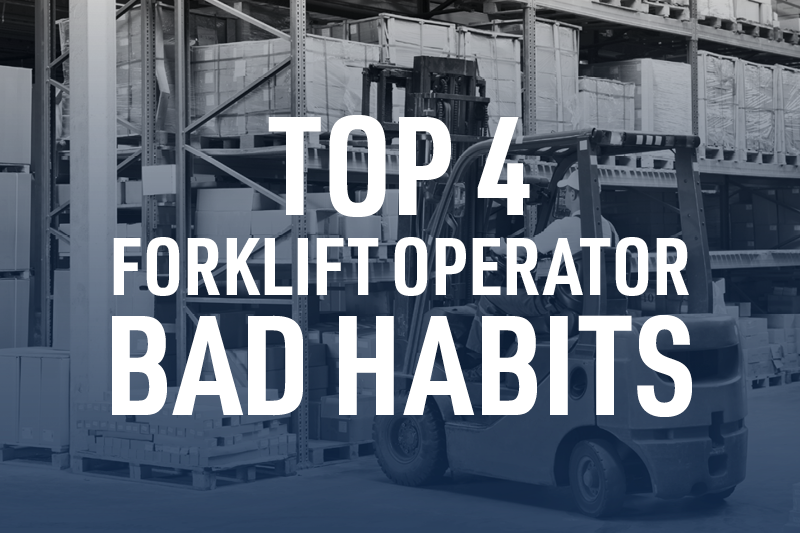
Ever seen someone trying to drive and text at the same time? Most of us have, even though we all know using a smartphone while driving is dangerous. Unfortunately, a recent survey by the AAA Foundation for Traffic Safety found:
- 52% of drivers admitted to holding their phone and talking while driving
- 40% said they read a text or email while driving
- 32% admitted to writing a text or email while driving
… in the past 30 days
What does this have to do with forklifts? Just like experienced drivers do things they know they shouldn’t, forklift operators sometimes make poor decisions. This isn’t a knock against hard-working, responsible forklift drivers. Stress, fatigue and other factors can cause even experienced forklift operators to make mistakes.
Here are the top four forklift operator bad habits that cause expensive incidents:
There’s No Such Thing as a Forklift Accident
A quick note before we dig in. Have you noticed OSHA typically uses the word “incident,” instead of “accident”? Ever wonder why? The answer is important.
As OSHA explains on their website: “accident" brings to mind an unplanned, unwanted event that was random, and could not have been prevented. OSHA investigates incidents (not accidents) because nearly all worksite fatalities, injuries, and illnesses are preventable.
In OSHA’s view, collisions and injuries don’t just happen. They start as a small issue or bad habit that, left unaddressed, eventually blow up into a major problem. With that in mind, here are four forklift operator bad habits that are the root cause of countless incidents/accidents (whatever you want to call them).
Bad Habit #1: Rushing
Rushing takes many forms: speeding, skipping the pre-shift safety check, unbalanced loads or even terse replies. When forklift operators feel stressed out about meeting a deadline or quota, they may prioritize speed over safety.
This bad habit is self-reinforcing, so it’s important to catch it early. For example, whenever a forklift operator shoots around a corner going faster than they should and they don’t tip over, it reinforces the behavior. They’ll keep their foot on the accelerator until a fateful day when the worst happens. Of the 80 or so forklift-related fatalities every year, nearly half are tip-overs.
How to prevent this bad habit:
- If you observe operators driving too fast or you just get the sense they’re stressed out, remind them of the human consequences of a serious incident.
- Use telematic safety checklists so the operator can’t use the forklift until they’ve completed a thorough pre-shift inspection.
- Ask supervisors to emphasize safety is always the #1 priority.
When Driving a Forklift, What’s Considered Speeding?
A common question we hear during our forklift operator training courses is, “Does OSHA Have a Speed Limit for Forklifts?”
Yes and no. OSHA provides a detailed explanation on their website, but the short answer is: there are too many factors to set a single speed limit. The safest maximum speed for a forklift carrying a load will be lower than one without a load. The driving surface and presence of pedestrians are a few other factors.
Bad Habit #2: Reckless Behavior
Speeding is a classic example of reckless behavior, but there are others to be alert for including:
- Allowing someone to stand or ride on the forks
- Failing to use signaling devices
- Not wearing a seat belt
How to break this bad habit:
When drivers violate safety rules, that’s a culture problem (and a dangerous one). Having a safety policy isn’t enough; it must be enforced. That said, you don’t want a culture where team members constantly worry about being fired.
While extremely dangerous behavior should be grounds for termination, minor, first-time violations can have lesser penalties. Ask your team to brainstorm light-hearted penalties for breaking a minor safety rule. Maybe the operator has to wear a clown wig for the rest of their shift or buy donuts for the crew the next day. Giving workers the opportunity to create a safe work environment can improve compliance and morale.
Bad Habit #3: Working While Fatigued
Motor vehicle drivers who feel physically or mentally tired are three times more likely to crash than drivers who are well-rested. Fatigue is also a serious hazard for forklift drivers and those around them.
Whether due to lack of sleep, a labor-intensive shift, dehydration or poor ergonomics, a fatigued forklift operator is more likely to make mistakes. Tired operators have poor situational awareness; they’re more likely to “zone out” behind the wheel.
Physical exhaustion is also a problem. Let’s say a forklift operator spends a lot of their shift driving in reverse. At the end of the day, their back and neck ache so much, they barely glance behind the truck before backing up. That’s when nasty accidents can happen.
How to prevent fatigue-related mistakes:
- Be open-minded to requests for ergonomic equipment such as a new operator’s seat or backup handles.
- Encourage supervisors to check in with operators who appear fatigued and authorize short rest breaks when needed. A 20-minute “power nap” has been proven to improve focus when someone is tired.
- Ensure forklift operators drink water throughout the day, not just coffee or energy drinks.
Bad Habit #4: Resistance to Training
Experienced forklift operators sometimes grumble about refresher training. Some honestly believe it’s a waste of time, others know they need additional training, but think they’re playing it cool by saying they don’t.
There’s a reason OSHA requires forklift operators receive training on new equipment and renew their certification every three years (sooner if they’re involved in an incident or near-miss). According to OSHA stats:
- 20-25% of forklift incidents are the result of inadequate training.
- Proper training and safety policy enforcement can prevent 70% of forklift incidents.
Is it possible to break this bad habit? Some operators will always grumble about training, but if you notice the entire team cringing, it might be time to reassess or outsource your training program.
Forklift and Warehouse Safety Training
Forklift operators are some of the hardest-working folks around. Their jobs are both physically and mentally demanding, requiring both intense focus and situational awareness. Over time, even experienced forklift operators develop bad habits, so it’s important to keep safety procedures and best practices top of mind.
Periodic safety training is one of the best ways to prevent employee injuries, product and equipment damage. Our experienced team can create a custom training program to help your operation run more efficiently, avoid expensive fines and help your associates get home safely to their families each day.
Whether you need to certify aerial or forklift operators, create a pedestrian safety program, or provide refresher training, we’re here to support you. The Lilly Company offers:
- OSHA-Approved Forklift Certification Classes
- Forklift Refresher Training
- Aerial and Scissor Lift Certification
- Forklift Trainer Certifications
Fill out our training inquiry form to connect with a safety expert who can answer any questions you may have or to schedule training at your facility. Prefer to speak to someone in person? Phone 844-LILLYCO (1-844-545-5926) or come say hello at one of our 13 locations across the Mid-South.
Arkansas - Jonesboro
Alabama - Birmingham, Dothan, Irondale, Madison, Mobile, and Montgomery
Mississippi - Tupelo and Richland
Tennessee - Jackson, Kingsport, Knoxville, and Memphis
Further Reading:
OSHA Forklift Pedestrian Safety 101
Why You Need an OSHA Forklift Certification Program
OSHA Forklift Training Requirements
Posts by Tag
- Forklift (61)
- Forklift Service (19)
- Electric Forklifts (16)
- Forklift Safety (14)
- Forklift Attachments (12)
- Toyota Forklifts (12)
- Warehouse Planning (10)
- Parts (9)
- Pallet Racking (8)
- Warehouse Automation (8)
- Clark Forklifts (7)
- Loading Docks (7)
- Material Handling Education (7)
- Customer Solutions (6)
- Forklift Batteries (6)
- Forklift Rental (6)
- Purchasing Options (6)
- Aerial Equipment (5)
- Heavy Equipment (5)
- Forklift Accessories (4)
- Forklift Fleet Management (4)
- Forklift Tires (4)
- Forklift Training (4)
- Products (4)
- Utility Vehicles (4)
- Yard Spotter Trucks (4)
- Linde (3)
- Pallet Jacks (3)
- Specialty Forklifts (3)
- Used Equipment (3)
- IC Forklifts (2)
- Manitou (2)
- Warehouse Doors (2)
- COMBiLift (1)
- Custom Shop (1)
- Forklift Brakes (1)
- Forklift Warranty (1)
- Gehl (1)
- Komatsu (1)
- Product Review (1)
- Recruitment (1)











